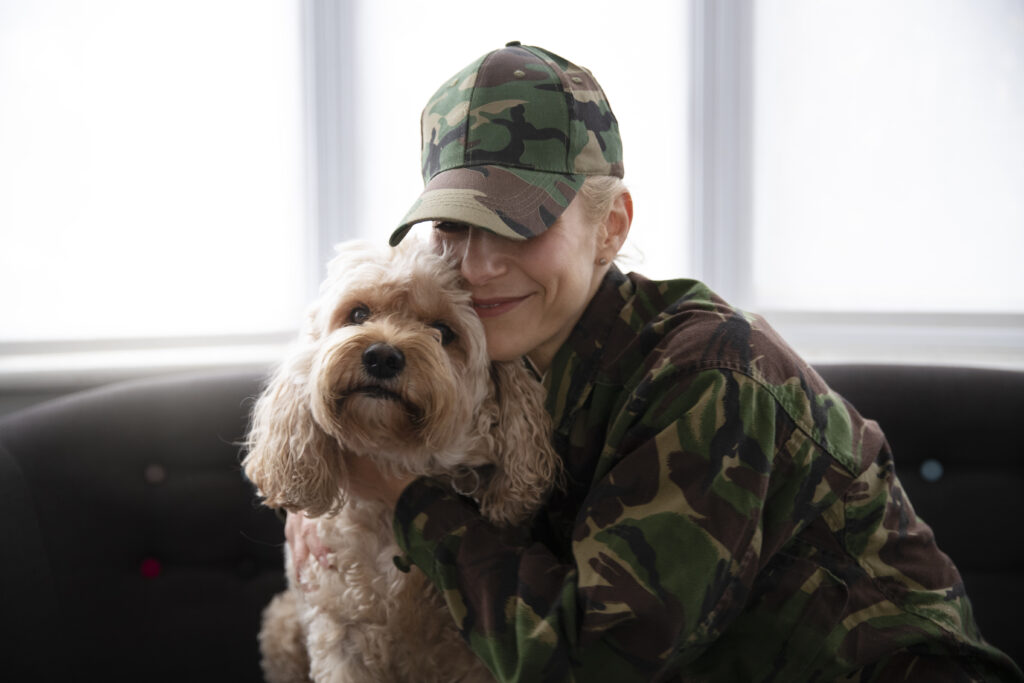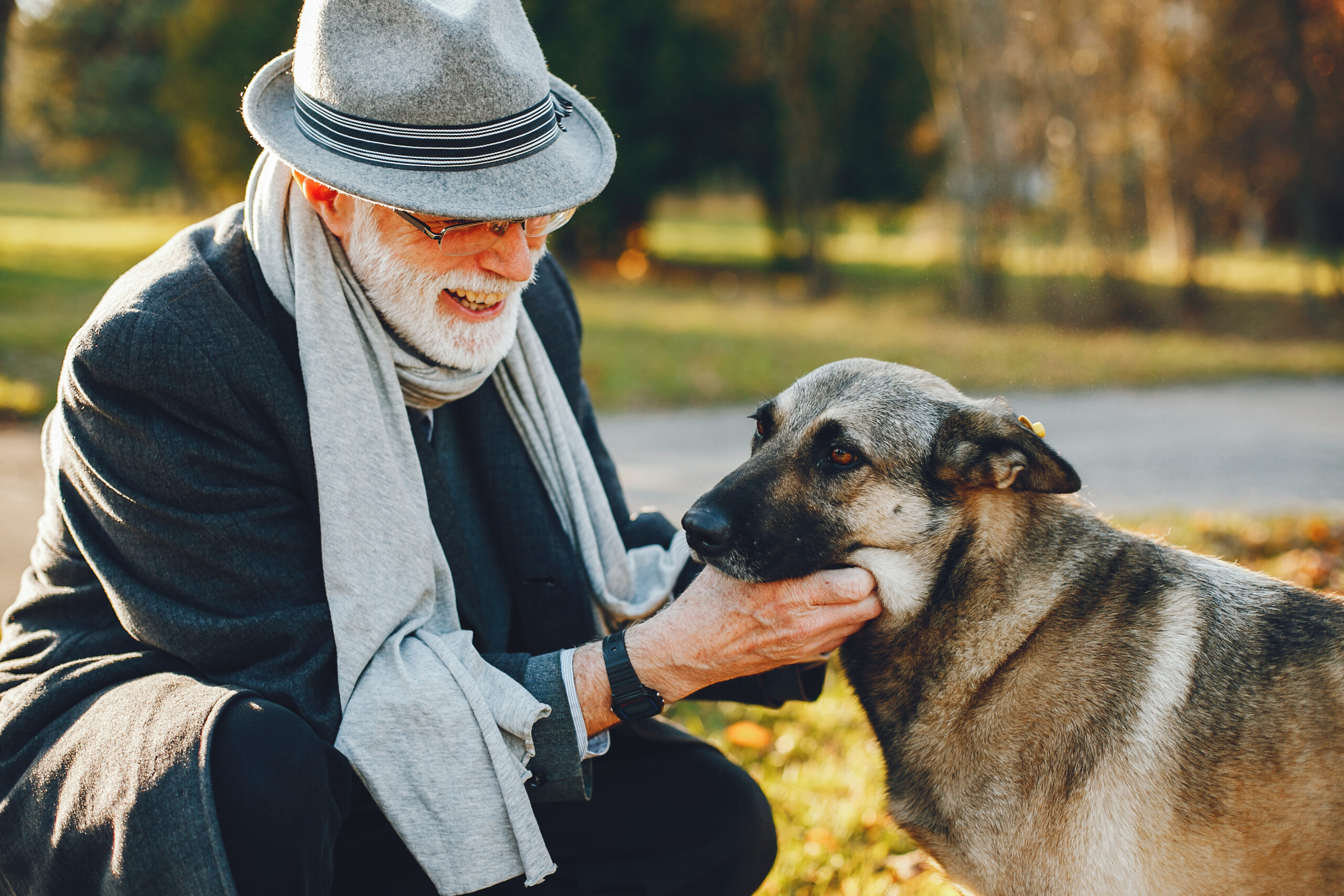Service dogs for veterans with PTSD significantly improve mental health and overall well-being. These incredible animals provide not just physical assistance, but also emotional support, allowing veterans to regain a sense of independence and stability. In this post, we’ll explore how service dogs help veterans with PTSD, the benefits they provide, and how veterans can obtain one.
For more on animal-assisted therapy, check out our post on What is Zoothérapie?
What Are Service Dogs for Veterans with PTSD?
Service dogs for veterans with PTSD undergo special training to assist individuals with post-traumatic stress disorder. Unlike emotional support animals, these dogs perform specific tasks to help manage PTSD symptoms. These tasks include offering comfort during anxiety attacks, guiding through crowds, and interrupting harmful behaviors linked to PTSD.
Service dogs are vital tools for veterans with PTSD, helping them manage daily life beyond just being companions.
The Benefits of Service Dogs for Veterans with PTSD

Service dogs for veterans with PTSD provide essential support that significantly impacts both mental and physical health. Here are some of the ways they help:
- Anxiety Reduction: Service dogs can detect signs of anxiety and help mitigate its effects by providing comfort or guiding veterans away from stressful situations.
- Improved Social Interaction: Veterans with PTSD often feel isolated. Service dogs help veterans feel more comfortable in social settings by acting as a calming presence.
- Panic Attack Prevention: Some service dogs are trained to interrupt panic attacks, alerting the veteran before an attack happens and guiding them through it.
- Emotional Support: The constant companionship of a service dog provides emotional support, helping to alleviate feelings of depression or loneliness.
Studies show that service dogs for veterans with PTSD reduce stress and help them reengage in life with greater security.
How to Get a Service Dog for Veterans with PTSD
Veterans seeking a service dog typically start by contacting organizations that specialize in PTSD dog training. Some programs offer the service free of charge, while others may require a fee or financial assistance. Here’s a general overview of the process:
- Research Service Dog Programs: Organizations such as Paws for Patriots and Canine Companions offer programs specifically designed for veterans with PTSD.
- Application Process: Veterans will need to apply, including medical documentation and an assessment of their needs.
- Matching and Training: Once accepted, veterans are paired with a dog that meets their needs. Training sessions will begin, where the veteran and the dog work together to form a bond and learn how to address specific PTSD symptoms.
- Ongoing Support: After placement, the veteran receives continued support to ensure a successful partnership with their service dog.
If you are interested in how different animals support various mental health needs, read our post on Therapeutic Dogs for Autism Support.
How to Train a Dog for Service Work

Training a dog to be a service animal, especially for a veteran with PTSD, requires specialized knowledge and skills. While many veterans choose to work with service dog organizations, some may wish to train their dogs. This involves teaching the dog specific tasks, such as alerting to anxiety symptoms, providing physical support, or interrupting harmful behaviors. Professional trainers often assist in this process, ensuring the dog is ready to provide life-changing support.
Learn more about animal-assisted training techniques in our post on 3 Powerful Therapy Techniques Enhanced by Animal-Assisted Therapy.
Common Myths About Service Dogs for Veterans with PTSD
There are several myths surrounding service dogs for veterans with PTSD that can lead to confusion. Let’s clear them up:
- Myth 1: Service dogs are too expensive. While some programs charge fees, many offer financial assistance or provide service dogs for free.
- Myth 2: Any dog can become a service dog. In reality, not every dog has the temperament or skills required for this work. Service dogs need to be calm, obedient, and highly responsive to their handler’s needs.
- Myth 3: Service dogs only help with mobility issues. While they can assist with mobility, service dogs for PTSD are trained to handle mental health challenges, providing critical support for veterans with anxiety, depression, and other PTSD symptoms.
If you're curious about the kinds of dogs best suited for service work, explore our post on Best Therapy Dog Breeds for Support.

Conclusion
Service dogs for veterans with PTSD offer much more than companionship—they are integral to helping veterans manage their symptoms and reclaim their lives. These dogs provide emotional support, reduce anxiety, and promote social interaction, allowing veterans to live more independently and with greater peace of mind. If you or someone you know is interested in learning more, several organizations provide service dogs specifically trained to assist veterans with PTSD.

